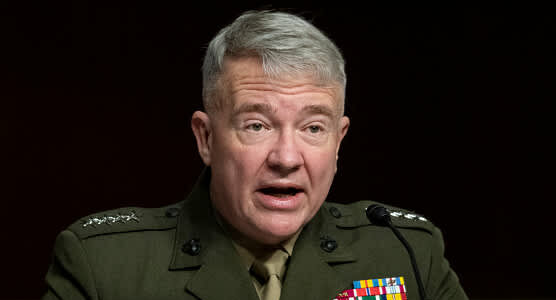
Top U.S. general in Middle East worried about potential collapse of Afghan military after troop withdrawal
- U.S. Marine Gen. Kenneth McKenzie, head of U.S. Central Command, said on Thursday that he was concerned that the Afghan military would collapse after U.S. and foreign troops leave.
- Last week, President Joe Biden announced he would withdraw all U.S. troops from Afghanistan by Sept. 11, ending America's longest war.
- "My concern is the ability of the Afghan military to hold the ground that they're on now without the support that they've been used to for many years," McKenzie said.
WASHINGTON – The head of U.S. forces in the Middle East said on Thursday that he was concerned that the Afghan military would collapse after U.S. and foreign troops leave the war-torn country.
McKenzie's remarks come on the heels of President Joe Biden's order to withdraw all U.S. troops from Afghanistan by Sept. 11, ending America's longest war.
"I am concerned about the ability of the Afghan military to hold on after we leave, the ability of the Afghan Air Force to fly, in particular, after we remove the support for those aircraft," Marine Gen. Kenneth McKenzie, head of U.S. Central Command, said during a Senate Armed Services Committee hearing on Thursday.
Afghan forces, he said, have gotten used to the support from U.S. and other nations' militaries over several years.
Later at the Pentagon, McKenzie said Biden consulted with him and other top military brass before the commander-in-chief made the call to pull the troops.
"The president went out of the way to ensure all views were on the table," he said. "I think we all recognize there were risks ahead that fall as a result of that decision. But I would reject the assertion that we're out of step."
A White House representative referred CNBC's request for comment on McKenzie's remarks to the National Security Council.
McKenzie also told reporters that while the U.S. will continue to support Afghanistan from afar, he was particularly concerned about aircraft maintenance.
The machines are maintained largely by contractors from the U.S. and other nations, he said. The U.S. intends to find innovative ways of replacing these services in a way that wouldn't involve boots on the ground, he added.
When asked about the trillions of dollars that had been invested in training and assisting the Afghan military, McKenzie said he believed the U.S. had seen a "good return on our investment."
The wars in Afghanistan, Iraq and Syria have cost U.S. taxpayers more than $1.57 trillion collectively since Sept. 11, 2001, according to a Defense Department report. More than 2,000 U.S. service members have died in Afghanistan.
The removal of approximately 3,000 American service members coincides with the 20th anniversary of the Sept. 11, 2001, terror attacks which spurred America's entry into lengthy wars in the Middle East and Central Asia.
"It is time to end America's longest war. It is time for American troops to come home," Biden said in his televised address from the White House Treaty Room, where former President George W. Bush announced military action against al-Qaeda and the Taliban in October 2001.
Biden's withdrawal timeline breaks with a proposed deadline brokered last year by the Trump administration with the Taliban. According to the deal, by May 1, 2021, all foreign forces would leave Afghanistan.
Source: Read Full Article